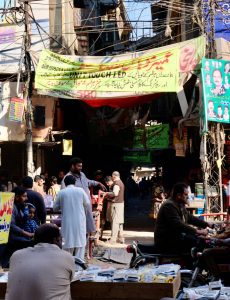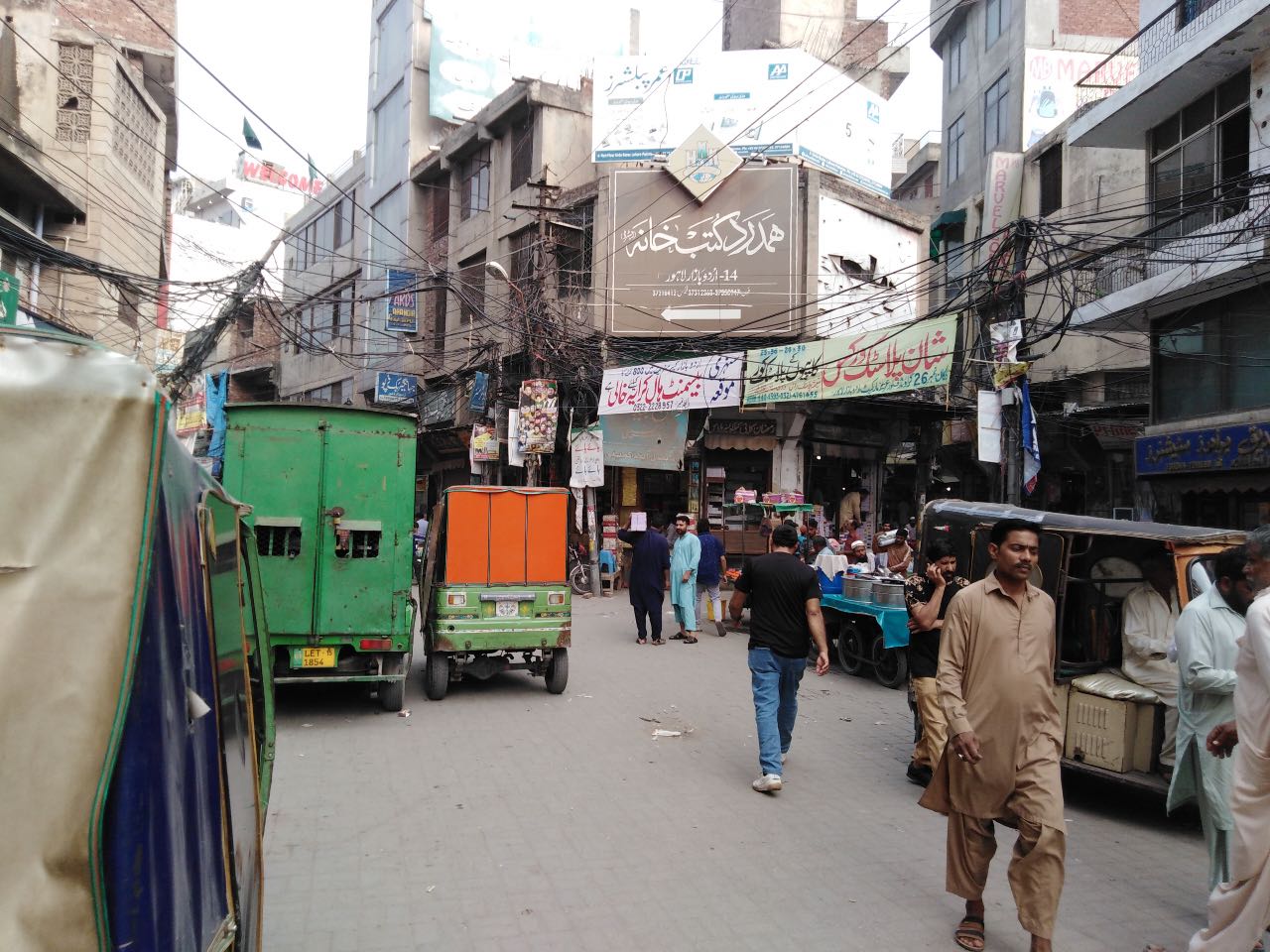 Pakistan’s film industry remains a comparatively understudied area, especially by social scientists interested in Pakistan’s socio-cultural landscape. In our penultimate post to mark the 75th anniversary of her independence, Timothy P. A. Cooper writes about the industry and its intercalated businesses, embroiled in the changing religio-moral politics of the times, and the economic vicissitudes of the market.
Pakistan’s film industry remains a comparatively understudied area, especially by social scientists interested in Pakistan’s socio-cultural landscape. In our penultimate post to mark the 75th anniversary of her independence, Timothy P. A. Cooper writes about the industry and its intercalated businesses, embroiled in the changing religio-moral politics of the times, and the economic vicissitudes of the market.
One of the ways I would strike up conversations with traders on Lahore’s Hall Road, Pakistan’s largest electronics and media marketplace, was to ask for a film that I suspected was lost to history.
I was conducting ethnographic research into the circulation and distribution of Pakistani films. My interlocutors were those whose labour or professional reputations relied on the trade in licenced, informal or pirated copies of films, mainly those associated with the Lahore-based ‘Lollywood’ film industry. By the time I turned up in 2017, Hall Road’s association with the sale of films copied onto cassette, disc or digital platforms was fading. Smartphones, televisions, Internet data, digital storage devices and myriad computing paraphernalia were taking its place. Still, the promises and moral dangers of film continued to loom large. What many described as film’s ‘atmosphere’, using the Hindustani word mahaul, tended to cling to persons and things. This atmosphere was invariably a negative one, associated with obscenity, indecency and widely considered by Islamic reform movements to be incompatible with what Pakistan should strive to become. I was there to learn how these traders managed to benefit economically from a public culture saturated with conflicting ideas around film and public morality.

Photo 1: A loudspeaker announces the call to prayer on Lahore’s Hall Road, Pakistan’s largest electronics market and former centre of the informal and pirated film trade © Author, 2017 (see information below).
Despite the changes, two types of film traders continued to thrive. There were those who sold films that were widely available on video-hosting websites to those who did not or could not use the Internet. And then there were those with the connections, collections or expertise to retrieve films that were unavailable online or in the dispersed inventory of copies that had long circulated in the marketplace that I call the Hall Road ‘repertoire’. Asking for a film likely lost to history taught me things that I, an anthropologist studying moving-image media, found illuminating. This included how film traders went about retrieving hard-to-find material from collectors, the technical means they used to transfer from video cassette to optical discs or digital files, the lack of state investment and the absence of a national film archive, or the disinterest of producers and directors who allowed their films to disappear into the ether.
I would often ask for a film called Neela Parbat, made in 1969 by the writer and journalist Ahmad Bashir. It was one of a small number of films made at the time that were inspired by mid-century European cinema. Despite the premium film historians place on these rare experiments, most were considered ‘flops’, and met with a disinterested public. Many of the film traders I worked with confirmed that Neela Parbat, a psychological drama about a father’s repressed desire for his adopted daughter that eschewed the usual genre conventions common to Pakistani films of the era, had never been subject to ‘public demand’. Like many English-language economic or business terms, the word ‘demand’ had become integrated into spoken Urdu and Punjabi. As an abstract economic concept that usually describes purchasing power, ‘demand’ on Hall Road presumes that a loosely defined people — often termed awaam in Urdu — can be trusted to act as the arbiters of taste and public morality.
I discussed some of these matters with Qasim, a young man in his twenties who did not fit easily into the two categories of film traders described above. His grandfather had established a radio repair shop on Hall Road in the 1960s. His father joined the film trade in the 1980s, before Qasim took over in the 2010s. Over the counter they maintained an important sub-repertoire of Islamic films, documentaries on Muslim saints, and devotional songs. Under the counter, they sold local pornography. The street’s official trade union, the Anjuman-e-Tajran Hall Road, assured me that this kind of thing did not happen. In 2008 they staged a bonfire of over 60,000 compact discs (CDs) and videos whose content was classed as pornographic. Despite the demonstrative nature of the bonfire, this was one instance where traders were not responding to public demand. At a time of upheaval caused by the militant Tehrik-e Taliban Pakistan (TTP), several low-intensity blasts had targeted the street, following an anonymous threat warning traders to curb the sale of un-Islamic content. Hall Road briefly become international news, with journalists around the world describing this event as the beginning of the ‘Talibanisation of Lahore’.

Photo 2: Yaseen Street, a side-street formed in the shadow of Hall Road’s shopping plazas © Author, 2017 (see information below).
Qasim said that the film I asked for sounded like an ‘art film’, a term used in his profession as a synonym for films containing sexual themes. Perhaps this is why it had seemed to have evaded the Hall Road repertoire. It was presumed to be unpopular or offensive enough to public taste not to stock but not immoral enough to warrant clandestine sale. While as far as film was concerned this demand was hard to gauge, Qasim’s trade in religious media seemed to follow a more discernible logic. He would speak to hereditary guardians and followers of local Muslim shrines and take the pulse of the atmosphere of the prayer gatherings and commemorations he attended to find out what was popular and what was permissible for public sale. In the material, visual and sonic culture of Islamic media in Pakistan, the threshold for what might cause offense frequently expands and contracts. While Qasim felt ambivalence towards cinema as an industry and art form, his experience and perception of religious needs and wants, and his self-professed expertise in gauging economic demands, allowed him to navigate this difficult terrain.
One afternoon, Qasim called me over to his stall and switched on the television he used to preview the quality of his CDs. The opening credits of the film Neela Parbat began to roll. By chance, Qasim’s cousin had visited Karachi and tracked down a man who sold copies made to order from his large collection of video cassettes. I asked him what he thought of the phenomenon that it has been collectors and traders, rather than the state or film industry, who have kept older Pakistani films safe from oblivion. I was wrong, he told me, to use the verb mahfuz karna, ‘to keep safe’; instead, I should use sambhalna to describe the act of ‘keeping steady’, such as how a plate-spinner renews the kinetic force to ensure the suspended object does not fall. The way Qasim described it, keeping-steady assumes that the object in question was put in motion by someone else. The trader is an ethically neutral conduit who does not keep films safe but ensures their continued presence within the repertoire.

Photo 3: The credits of Neela Parbat (1969) © Author, 2017 (see information below).
It is ‘demand’ that helped Qasim decide which plate to charge with kinetic force. Demand describes a collective wish emanating from an undefined collective, as well as the displacement of responsibility onto this collective. It becomes both an ethical and an economic principle that determines both what is desired and what is permissible among the public at large. On Hall Road, demand is censorial as well as commercial. It is also about the moods, needs and atmospheres that economic life is predicated on but that economists often struggle to pin down. As I understood it among my interlocutors, the notion of public demand not only imagines a people, it also attempts to methodologically locate their will. For these traders, it provides a moral alibi. Whether a film manages to please or offend, its circulation is not one person’s responsibility. All they are doing is keeping the plate spinning.
*
The views expressed here are those of the author and do not represent the views of the ‘South Asia @ LSE’ blog, the LSE South Asia Centre or the London School of Economics and Political Science. Please click here for our Comments Policy.
Photographs © Timothy P. A. Cooper; no photograph may be used/reproduced without written permission of the author.
This blogpost may not be reposted by anyone without prior written consent of LSE South Asia Centre; please e-mail southasia@lse.ac.uk for permission.
Banner image © Anika De Klerk, 2019, Unsplash.
The ‘Pakistan @ 75’ logo is copyrighted by the LSE South Asia Centre, and may not be used by anyone for any purpose. It shows the national flower of Pakistan, Jasmine (Jasminum officinale), framed in a filigree design adapted from Islamic architecture. The logo has been designed by Oroon Das.
*







